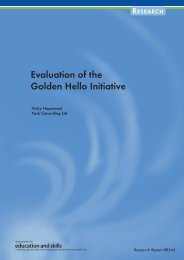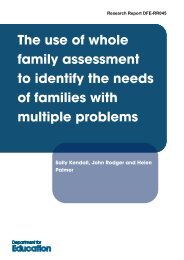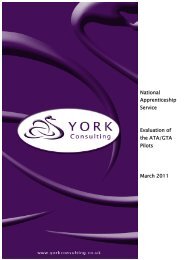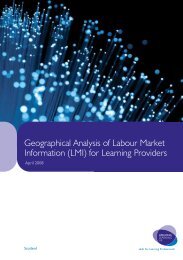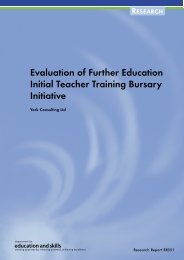Recruitment and Retention in the Post-16 Learning and Skills Sector
Recruitment and Retention in the Post-16 Learning and Skills Sector
Recruitment and Retention in the Post-16 Learning and Skills Sector
Create successful ePaper yourself
Turn your PDF publications into a flip-book with our unique Google optimized e-Paper software.
• organisational issues – l<strong>in</strong>ked to a perceived general lack offund<strong>in</strong>g <strong>in</strong> <strong>the</strong> sector overall: “its really <strong>the</strong> lack of money <strong>in</strong> fur<strong>the</strong>reducation which doesn’t allow <strong>the</strong> college to support <strong>the</strong> staff. It’svery hard to do your job properly or to <strong>the</strong> st<strong>and</strong>ard that you’d liketo do it because you have not got <strong>the</strong> time. So I th<strong>in</strong>k lack ofmoney is <strong>the</strong> basic underly<strong>in</strong>g problem”. [Fur<strong>the</strong>r Education];• low pay <strong>and</strong> <strong>in</strong>secure terms <strong>and</strong> conditions, <strong>in</strong> particular, <strong>in</strong>relation to <strong>the</strong> school sector. O<strong>the</strong>r related issues <strong>in</strong>clude localimplementation of nationally agreed pay scales <strong>and</strong> differences <strong>in</strong>pay<strong>in</strong>g conditions between departments <strong>in</strong> <strong>the</strong> same <strong>in</strong>stitution;• poor <strong>in</strong>frastructure/equipment – this especially relates tosubjects with high equipment costs, such as, manufactur<strong>in</strong>g <strong>and</strong>eng<strong>in</strong>eer<strong>in</strong>g: “my ma<strong>in</strong> problem is not be<strong>in</strong>g able to buy newteach<strong>in</strong>g aids <strong>and</strong> new resources … you keep gett<strong>in</strong>g told to put abus<strong>in</strong>ess case forward for it, you do that <strong>and</strong> noth<strong>in</strong>g ever getsdone – we haven't got enough money”. [Work Based Learn<strong>in</strong>g];• changes <strong>in</strong> <strong>the</strong> sector – <strong>and</strong> <strong>the</strong> consequent change <strong>in</strong> clientgroups, <strong>in</strong> particular <strong>the</strong> <strong>in</strong>crease <strong>in</strong> younger students <strong>in</strong>volved <strong>in</strong>fur<strong>the</strong>r education colleges <strong>and</strong> work based learn<strong>in</strong>g providers l<strong>in</strong>kedto 14-<strong>16</strong> developments;• limited or unclear career pathways – <strong>the</strong>re is concern that <strong>the</strong>career path for teachers/tra<strong>in</strong>ers is limited because <strong>the</strong> choice isei<strong>the</strong>r to rema<strong>in</strong> <strong>in</strong> teach<strong>in</strong>g or to become part of <strong>the</strong> managementteam. With <strong>the</strong> latter option, teach<strong>in</strong>g hours are reduced, whichsome respondents view as a drawback because of <strong>the</strong>ir enjoymentof <strong>the</strong> teach<strong>in</strong>g aspects of <strong>the</strong>ir job: “I don’t th<strong>in</strong>k <strong>the</strong>re is much, <strong>in</strong>terms of, career development for a lecturer. If you're a lecturer youare a lecturer, o<strong>the</strong>rwise you become a manager. There is nostructure for career development. If you're a dedicated lecturer, Ith<strong>in</strong>k that <strong>the</strong> choice between be<strong>in</strong>g <strong>the</strong> lecturer <strong>and</strong> managementis a large step that not many of us wish to take because you losetouch with what you were orig<strong>in</strong>ally signed up to do”. [Work BasedLearn<strong>in</strong>g];• excessive paperwork <strong>and</strong> bureaucracy. Many respondentsmentioned high levels of bureaucracy, <strong>in</strong> particular, staffdissatisfied with <strong>the</strong>ir job all mention this issue. Requests for<strong>in</strong>formation <strong>and</strong> paperwork are perceived to exist both externally(such as, <strong>the</strong> LSC, exam<strong>in</strong>ation boards <strong>and</strong> OfSTED) <strong>and</strong> <strong>in</strong>ternally(<strong>in</strong> terms of, student progress <strong>and</strong> o<strong>the</strong>r management <strong>in</strong>formation).This leads to a perception that professionals <strong>in</strong> <strong>the</strong> sector aredistrusted by government <strong>and</strong> fund<strong>in</strong>g organisations: “we areemployed as professionals, with all of us who work <strong>in</strong> ourdepartment hav<strong>in</strong>g been through higher education tra<strong>in</strong><strong>in</strong>g <strong>and</strong>have degrees … but we are not trusted to be do<strong>in</strong>g a professionaljob, o<strong>the</strong>rwise why would people come <strong>in</strong> <strong>and</strong> want to <strong>in</strong>spect us all<strong>the</strong> time”. [Work Based Learn<strong>in</strong>g];70



